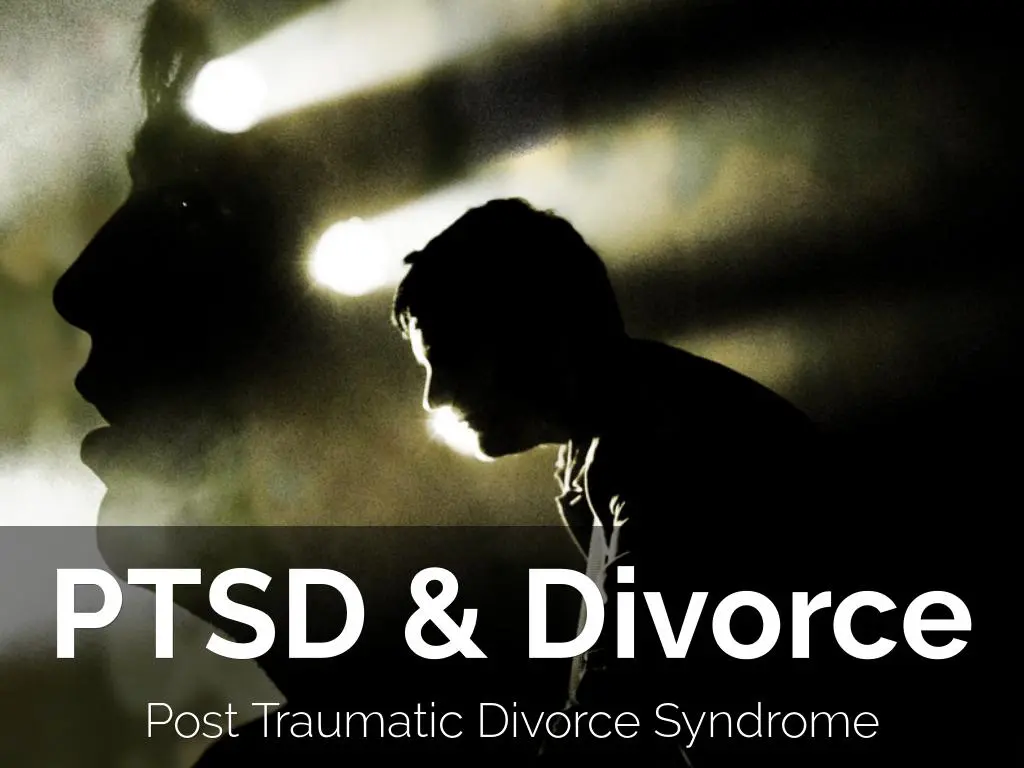Have you ever thought that a divorce could feel as painful as if you’ve been through a really scary or dangerous situation? Sometimes, the end of a marriage can shake up your life so much that it might lead to something called PTSD, or post-traumatic stress disorder. PTSD usually happens when someone goes through something really terrifying, but big life changes like divorce can trigger it too. If you find yourself having really vivid bad dreams, feeling scared out of the blue, or can’t stop thinking about the divorce, you might be dealing with PTSD.
In this blog, we’re going to talk about what it feels like to have PTSD after a divorce, how you can start feeling better, and where to find help. Let’s get started!
Contents
About PTSD
 PTSD, or Post-Traumatic Stress Disorder, is a condition that some people develop after going through a really tough and scary experience. This isn’t just about feeling upset; it’s when the event keeps bothering you long after it’s over. People with PTSD might have very vivid memories of the event that feel like they’re happening all over again, which can be really scary. They might also have nightmares, feel very jumpy, or have trouble sleeping. It’s like their mind is stuck on replay, showing them the scary parts over and over.
PTSD, or Post-Traumatic Stress Disorder, is a condition that some people develop after going through a really tough and scary experience. This isn’t just about feeling upset; it’s when the event keeps bothering you long after it’s over. People with PTSD might have very vivid memories of the event that feel like they’re happening all over again, which can be really scary. They might also have nightmares, feel very jumpy, or have trouble sleeping. It’s like their mind is stuck on replay, showing them the scary parts over and over.
Not everyone who goes through a hard time will get PTSD. It’s kind of like how some people get sick easily and others don’t. Our brains all deal with tough stuff in different ways. For those who do get PTSD, it can make everyday life really hard because they’re often reminded of the bad experience.
Understanding PTSD After Divorce
 Can going through a divorce really lead to PTSD? Yes, it can. While we often hear about PTSD in the context of soldiers returning from war or people who’ve survived natural disasters, it’s important to know that this condition can also arise after life-changing personal events, like a divorce.
Can going through a divorce really lead to PTSD? Yes, it can. While we often hear about PTSD in the context of soldiers returning from war or people who’ve survived natural disasters, it’s important to know that this condition can also arise after life-changing personal events, like a divorce.
Divorce isn’t just signing papers and moving on. For many, it’s a deeply emotional journey that involves saying goodbye to a shared life, dreams, and commitments.
- This upheaval can trigger feelings of loss, betrayal, and uncertainty about the future.
- For some people, the end of a marriage can be as traumatic as any physical danger, leading to symptoms very similar to those of PTSD.
- During and after a divorce, individuals might experience intense stress, fear, and anxiety.
- They might have trouble sleeping, suffer from nightmares, or feel constantly on edge.
- Memories of painful moments from the marriage or the divorce process itself can pop up without warning, making it feel as if they’re reliving the experience.
For those with PTSD from divorce, these aren’t just fleeting feelings of sadness; they’re persistent symptoms that can significantly impact their daily life.
Symptoms Of PTSD After Divorce
 Here are some of the signs of post-divorce trauma syndrome (PTSD):
Here are some of the signs of post-divorce trauma syndrome (PTSD):
- Withdrawal From Social Gatherings: The person suffering from PTSD would rather avoid social situations and will frequently miss a party or other gathering with large numbers of people.
- Rage And fury: The individual will almost certainly experience furious outbursts or emotional reactions on the fly. Mood swings are typical, but they’re more likely to manifest negative feelings.
- Sweating And Irregular Heartbeats: A racing heart is two of the most common symptoms among people who have been through a divorce. This might be caused by a current memory of a prior tragedy.
- Replay Of Past: The victim is unable to escape the agony. As a result, they continuously replay the event in their mind. They are most likely not doing it by force of will, and they have no control over it.
- Sleep Problems: The victim generally has restless sleep. They are not calm in their minds, making it difficult for them to have a restful night’s sleep with so much mayhem going on in their minds.
- Lack Of Attention: They can’t focus on anything because they remain mentally disturbed. They are not able to put their head to any task efficiently.
- Grief That Goes On And On: Grief is a difficult feeling to handle, but when it lingers for long, this is an indication of a traumatic divorce. Those who are exposed to such traumas may be unable to let go of their emotions.
- Bad Dreams: Because the victim is constantly thinking about the terrible experience, previous relationship trauma can result in unpleasant dreams and night terrors.
- Avoidance Of Tragedy: They don’t have the power to confront their dread yet, since they haven’t healed. Therefore, they will avoid anything that serves as a reminder of the tragedy.
Why Divorce Can Feel Traumatic

Going through a divorce can shake up your whole world. It’s not just about ending a relationship; it’s about dealing with a lot of changes and losses all at once, which can really take a toll on you.
Here’s why divorce can be such a traumatic experience for many people:
- Loss of Companionship: When you’re married, you have a partner to share your life with – your joys, sorrows, and everyday moments. Losing this companionship can leave a big void in your life, making you feel lonely and disconnected.
- Emotional Stress: Divorce can stir up a storm of emotions. You might feel sadness, anger, betrayal, or relief. These feelings can come all at once or swing wildly from one to another, making it hard to find stable ground.
- Legal Battles: For many, the process of divorce involves legal battles over property, finances, and custody of children. This can add a layer of stress and conflict that makes the emotional journey even harder.
- Identity Shift: Being part of a couple might be a big part of how you see yourself. After a divorce, you might question who you are outside of that partnership.
- Concerns for Children: If you have kids, you’re probably worried about how the divorce will affect them. Trying to navigate your own emotions while supporting your children can be overwhelming.
- Financial Strain: Divorce often comes with financial challenges, whether it’s the cost of the divorce itself, the loss of a dual income, or figuring out child support. These financial pressures can add to the stress of the situation.
All these factors can make divorce feel like a traumatic event. It’s a time of significant change, loss, and emotional upheaval.
Can Divorce Trauma Impact Children?
 Absolutely, the trauma from a divorce doesn’t just affect the adults going through it; children can feel the ripple effects deeply. When parents split up, it’s a huge change in a child’s world, one that can be very hard to understand and cope with. Here are some ways divorce trauma can impact children:
Absolutely, the trauma from a divorce doesn’t just affect the adults going through it; children can feel the ripple effects deeply. When parents split up, it’s a huge change in a child’s world, one that can be very hard to understand and cope with. Here are some ways divorce trauma can impact children:
- Children might feel a whirlwind of emotions like sadness, anger, confusion, or even guilt, thinking they might have caused the divorce.
- Divorce can shake up their daily lives, from where they live to how often they see each parent. This upheaval can make them feel insecure and anxious.
- A divorce can feel like a loss to a child. They might grieve the loss of the family they knew, their home environment, or the regular presence of both parents. This sense of loss can be profound and deeply felt.
- The stress and emotional turmoil of a divorce can spill over into a child’s performance in school and their interactions with friends.
- They might have trouble focusing on schoolwork or withdraw from social activities.
While divorce can be traumatic for children, it doesn’t mean there will be lasting damage. A lot depends on how the parents handle the divorce process and how they support their children through it.
Treatment
Fortunately, there are solutions available to heal from PTSD while coping with the traumatic phase of life, divorce. The different types of remedies are explained below:
Therapy
 If you’re finding it hard to deal with the symptoms of PTSD after a divorce, reaching out for professional help can be a big step towards feeling better. There are different types of therapy that have been shown to really help people with PTSD. Here’s a look at some options:
If you’re finding it hard to deal with the symptoms of PTSD after a divorce, reaching out for professional help can be a big step towards feeling better. There are different types of therapy that have been shown to really help people with PTSD. Here’s a look at some options:
- Cognitive Behavioral Therapy (CBT): It teaches you ways to deal with difficult emotions and can be really effective for managing PTSD symptoms.
- Eye Movement Desensitization and Reprocessing (EMDR): EMDR is another therapy that’s specifically designed for PTSD. It involves recalling distressing images while receiving one of several types of bilateral sensory input, like side-to-side eye movements.
- Group Therapy: Sometimes, talking with others who are going through similar experiences can be really helpful. Group therapy provides a safe space to share your feelings, learn from others, and gain support. Knowing you’re not alone in how you’re feeling can be a huge relief.
Remember, seeking help is a sign of strength, and therapy can provide you with the tools you need to heal and move forward.
Self Help Tips
 Taking care of yourself is especially important after a divorce. It’s a tough time, and it’s easy to forget to look after your own well-being. But self-care is key to healing and finding your way back to happiness. Here are some self-care strategies that can help you look after your mental health:
Taking care of yourself is especially important after a divorce. It’s a tough time, and it’s easy to forget to look after your own well-being. But self-care is key to healing and finding your way back to happiness. Here are some self-care strategies that can help you look after your mental health:
- Mindfulness Practices: Mindfulness can help you stay grounded in the present moment and manage overwhelming emotions. Techniques like deep breathing, meditation, or yoga can reduce stress and bring a sense of calm to your daily life.
- Pursuing Hobbies: Doing things you love can bring a lot of joy into your life. Maybe you have hobbies you’ve neglected for a while or new interests you’d like to explore. Now’s the time to dive into activities that make you happy and fulfilled.
- Spend Quality Time With Your Loved Ones: Spending time with friends and family can provide emotional support and reduce feelings of loneliness. Don’t hesitate to reach out to your loved ones for company or a listening ear.
- Seeking Joy: Make it a point to do something every day that brings you joy, no matter how small. Whether it’s listening to your favorite music, enjoying a cup of coffee in peace, or watching a sunset, find moments of happiness in your day.
Remember, taking care of yourself isn’t selfish; it’s necessary. By prioritizing your well-being, you’re building a stronger foundation for a healthy and happy future post-divorce.
Conclusion
Life isn’t always fair, and it puts a lot of individuals to the test by providing them with unique challenges. You’ll ask a lot of queries and wish bad things for yourself if you have PTSD as a result of divorce. However, life is about looking ahead, so get on with it! So, gather yourself together and start over. After all, life is all about forward motion rather than going backward.
For more information, please contact MantraCare. PTSD or Post-Traumatic Stress Disorder is a mental health condition that affects people who have experienced or witnessed a traumatic event. If you have any queries regarding Online PTSD Counseling experienced therapists at MantraCare can help: Book a trial PTSD therapy session


